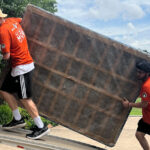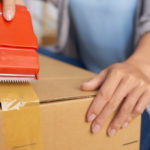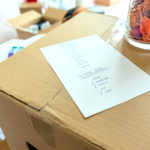So, you’re finally making the big move and getting your own place — exciting, right? No more checking in with the ’rents, no more sharing a bathroom with your siblings. You’re about to step into that sweet, sweet independence. But let’s be honest — moving out for the first time can feel overwhelming. Between figuring out your budget, packing all your stuff, and sorting out the details (furniture, WiFi, bills), it can start to feel like a lot.
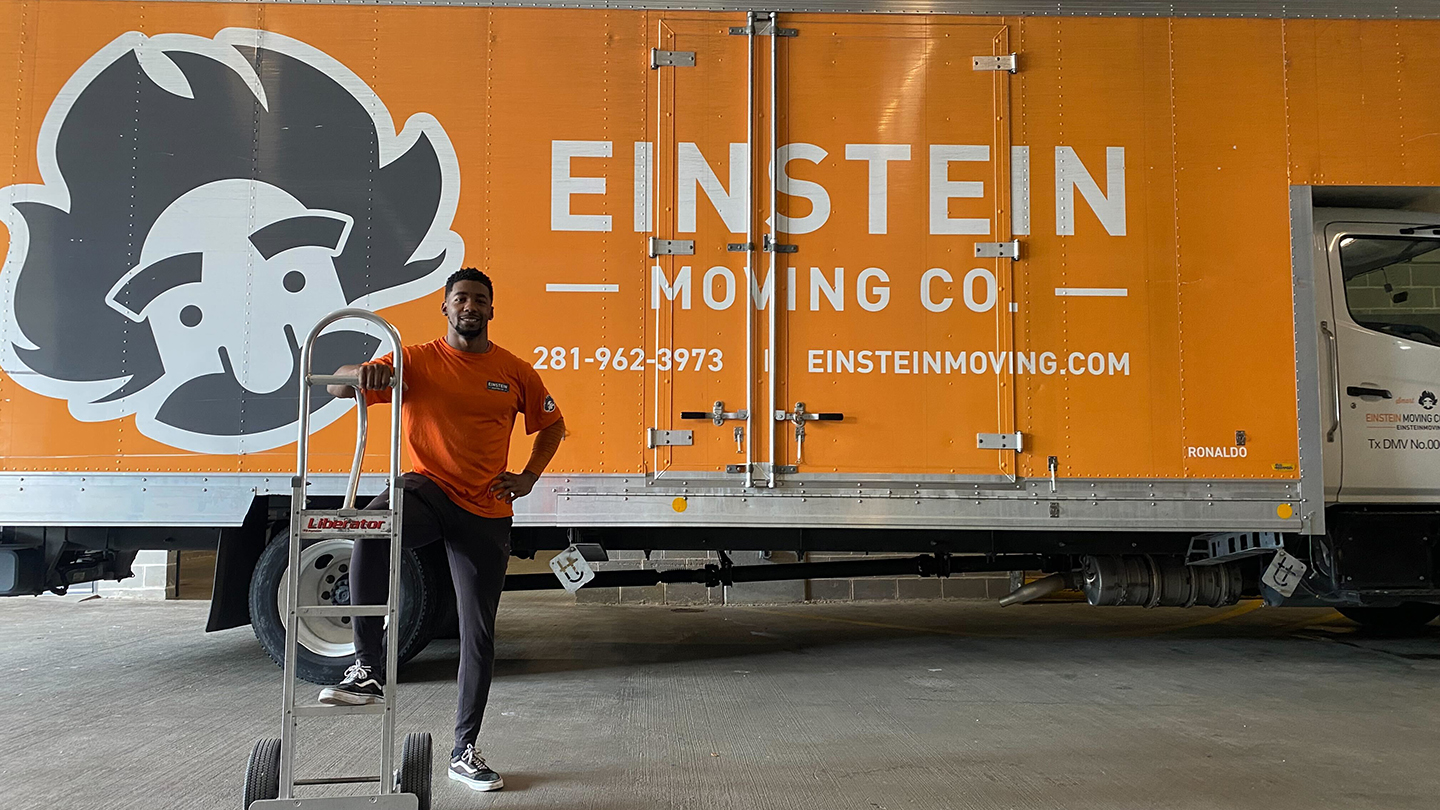
But don’t worry — with a bit of planning, your first move doesn’t have to be stressful. Here are some solid tips to help you get through it and feel confident as you settle into your new space.
What To Know Before You Move Out For The First Time
Moving out for the first time is a mix of all the feelings — excitement, nervousness, maybe even a bit of “What am I doing?” It’s totally normal to feel overwhelmed and anxious. After all, this is a huge step, and you’re about to take on responsibilities you probably haven’t had to think about before.
The good news? It’s also super exciting. The freedom of being on your own for the first time is something you’ll never forget — you can finally make your own decisions, decorate your space how you want, and basically just live life on your own terms. But, here’s the thing: that freedom comes with a few extra costs and responsibilities you might not have dealt with before.
Suddenly, there’s rent, utilities, groceries, and that pesky thing called budgeting. It can feel like a lot to juggle, but with a little prep, you’ll handle it like a pro. So, before you pack up those boxes, let’s talk about some key things you should know to make sure you’re ready to tackle this new chapter.
3 tips to mentally prepare for independent living:
Living on your own is a whole new vibe, and it’s not just about having your own space — it’s about getting comfortable with the responsibility that comes with it. Here are a few ways to mentally prepare for that next level of independence:
- Embrace the change: Moving out means new routines, new challenges, and a lot of freedom. It’s a learning curve, and that’s okay. Give yourself time to adjust – no one has it all figured out on Day 1.
- Stay connected: Just because you’re moving out doesn’t mean you have to do it all alone. Stay in touch with family and friends for support. It’s always good to know you’ve got a backup plan if something unexpected comes up.
- Be ready to problem-solve: Things will go wrong (sorry, but it’s true). Whether it’s figuring out how to unclog a drain or managing a budget, there’s always a fix. Don’t be afraid to ask for help or Google your way through a challenge. You’ve got this!
Financial considerations when moving out for the first time.
Freedom is awesome, but let’s be real — it’s not free! We’ve put together a list of things to consider when asking yourself if you can afford to move out:
Don’t wait! Start building your savings if you haven’t already!
One of the smartest things you can do before moving out is to build a financial cushion. Having a few months’ worth of rent and expenses saved up gives you peace of mind if anything unexpected happens (like your car breaking down or a surprise medical bill).
- Investing early: If you’re not already doing it, consider opening a brokerage account and investing in ETFs or index funds like the S&P 500. Compound interest is your friend, and the earlier you start, the better.
- Thrifty shopping: You don’t need to splurge on brand-new furniture or kitchenware. Hit up dollar stores, thrift shops, and online marketplaces like Facebook Marketplace. Even ask friends or family if they are getting rid of anything.
- Open a High-Yield Savings Account (HYSA): This is a simple way to get better interest rates on your savings compared to a regular account.
- Smart credit card use: Only spend what you can afford to pay off each month. Credit cards can be helpful, but racking up debt will only stress you out later! Keep it in check.
Estimate your initial moving-out costs.
Before you make the big move, it’s important to know what kind of cash you’ll need upfront. Moving isn’t just about rent — there are plenty of other costs you’ll need to factor in:
- Rent and deposits: You’ll usually need your first month’s rent and a security deposit (which could be the same as one month’s rent) upfront. Some places even ask for last month’s rent too, so keep that in mind.
- Furniture and all other essentials: If this is your first place, you’ll likely need some basics like a bed, couch, kitchen supplies, and cleaning stuff. It adds up quickly, so keep an eye out for secondhand options (or hand-me-downs from family or friends).
- Movers or truck rental: Decide if you’re going to hire movers or rent a truck and DIY. Either way, it’s going to cost something, so plan for it. And don’t forget the little things like gas for the truck, packing supplies, and maybe even pizza and drinks for any friends helping out.
💡 Pro tip on rent: Ideally, your rent (or mortgage) should be no more than 30% of your net income. Prioritize financial security over luxury amenities. As tempting as it is to have that swanky apartment with the rooftop pool, it’s more important to have money left over for, you know, food.
Develop a realistic budget.
Once you’ve got a handle on those initial costs, it’s time to build a budget that works for you. Here’s how to get started:
- Start with upfront costs: Include all the one-time expenses like deposits, furniture, movers, and any setup fees (utilities, internet, etc).
- Factor in ongoing costs: Monthly rent, utilities, groceries, transportation, phone bills — all the regular bills that come with living on your own. Make sure you know what your recurring expenses will look like, and set a budget that covers them without leaving you stretched too thin.
Remember everyone’s different, your budget will depend on your income, location, and lifestyle. Whether you’re a takeout-every-night kind of person or more into meal prepping, your budget should reflect your personal spending habits.
4 Essentials To Do Before Moving Out For The First Time
Let’s avoid a headache and prepare the important stuff before moving out for the first time.
1. Set Up Necessary Utilities
Depending on whether you’re renting or buying, you’ll need to get your utilities set up. Here’s what you’ll likely need:
- Electricity, gas, water, internet: These are your must-haves. Start by checking if any utilities are included in your rent. If not, contact local providers to set things up.
- Timing is everything: Make sure you set up utilities 1–2 weeks before your move so everything’s ready on Day 1. You don’t want to arrive at your new place with no power or WiFi, trust us.
- Find a deal: While you’re at it, check for any internet deals in your area. Sometimes internet providers have special offers for new customers, so take advantage of that!
2. Get The Right Insurance: Renter’s Vs Home Insurance
Renters and home insurance offer similar benefits, however, the major difference is that home insurance will protect the home’s physical structure, while renter’s insurance won’t.
While you may not care to spend the extra income on insurance, it’s important to protect your belongings from theft, fire, or damage. The average cost of renter’s insurance per month in Texas and Florida is about $13-$16. A small price to pay for peace of mind!
📝 Important: Homeowner’s insurance is often mandated by the lender if a mortgage is attached to the property while renter’s insurance is not required by state laws. However, sometimes a landlord will require renter’s insurance before a tenant can occupy an apartment, unit, or rental house — so make sure to confirm before you set a move-in date!
Not only can renter’s insurance protect your personal belongings like clothing, electronics (your TV, Xbox, laptop, etc), furniture, and other household items, but it can provide personal liability coverage — which is something to be considered if you like hosting!
Tips on finding the right renter’s insurance coverage:
Finding the right coverage can be tricky, use the tips below to help find the best type of coverage for your situation.
- Make sure to confirm with your provider what your renter’s insurance covers. It’s important to be well-informed about what type of coverage you’ll be paying for.
- Estimate the value of your personal property. Before you ask for a quote for renter’s insurance, you’ll need to know how much space is in your new place and what the value is of all your personal belongings.
- Do your research! Don’t just choose the first insurance company you speak with, shop around and compare different insurance companies to find the best coverage.
- Discuss deductibles. Remember, a higher deductible usually means a lower premium and a lower deductible means a higher premium.
- Ask about discounts. Sometimes insurance companies provide lower rates if you package up multiple types of insurance, like your vehicle and renter’s insurance. You might also get a deal if you have a college degree — so don’t forget to check!
💡 Pro-tip on insurance: Make sure to shop around annually for the best rates!
3. Don’t forget to change your address where you need to!
Don’t leave important mail behind! Make sure to set up mail forwarding through your local postal service so you don’t miss out on any important notices — even though you wish you could avoid jury duty!
Don’t stop there! You’ll also want to make sure you update your address at the following places:
- Driver’s license and voter registration
- Bank accounts and credit cards
- Health insurance and doctor’s office
- Subscription services (Netflix, Amazon, etc.)
- Online shopping accounts (because we all know those delivery addresses matter!)
💡 Pro tip: It’s super important to update your driver’s license and voter registration ASAP. Keeping your license up to date is required by law, and it’s your go-to ID for most things. Plus, if you want to vote in local elections at your new address, you need to be registered in your new area – it’s how you make your voice count in your new community!
4. Keep a copy of any important tenant or landlord agreements (if applicable).
If you’re renting, make sure you hold onto any important documentation. Here’s what to keep a copy of:
- Lease agreements — because sometimes landlords lose this paperwork, to avoid the headache, keep a copy yourself.
- Security deposit receipt — because there’s no way you’re missing out on getting this money back!
- Tenant consent (if applicable) — know your rights.
- Pet policy agreements (if applicable) — make sure your furry friend remains welcome.
- Move-in and out checklists — these checklists spell out a tenant’s responsibility when entering or leaving a rental property.
- Insurance documents — remember, sometimes these are required.
- Pay stubs or other necessary bank statements — keeping a recent pay stub on hand can be helpful if your landlord wants to check in.
💡 Pro Moving Tip: If there’s any other agreement, whether that be with your new landlord or a new roommate, we recommend keeping a folder of this information in a fireproof safe so you never have to worry!
First Time Moving Out Of Home Checklists
There’s nothing we love more than a helpful checklist so we don’t forget anything important. It’s easy to feel overwhelmed and the last thing we want for you is to forget something important that will make you more comfortable in your first week in your first home (or apartment!).
📦 Packing Checklist
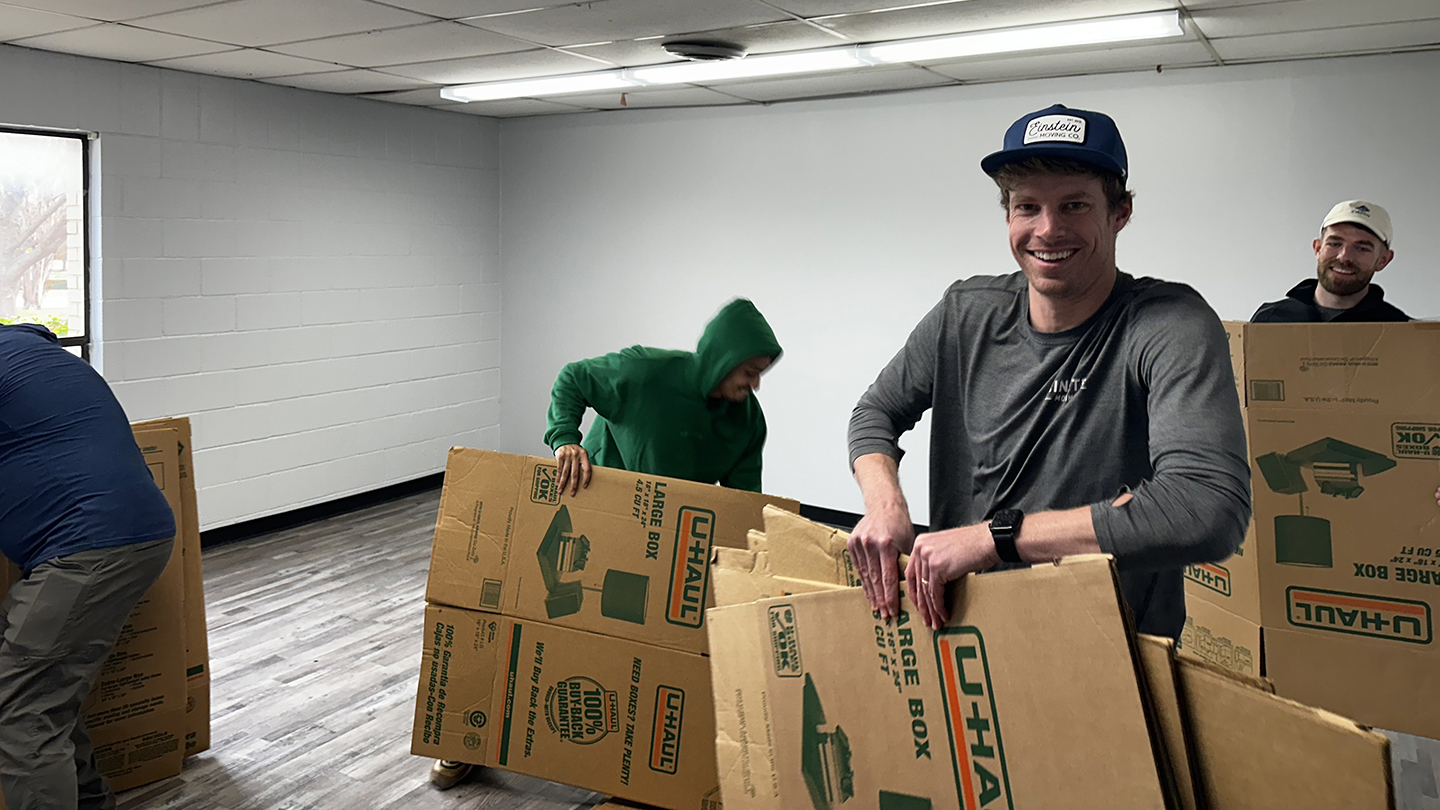
Packing can feel like a huge job, but breaking it down makes it way easier. Here’s a step-by-step checklist to help you pack smart, stay organized, and make unpacking a breeze when you arrive at your new place.
1. Start by categorizing your belongings.
Before you get overwhelmed, start by creating an inventory of what you have and what you need to pack, this includes:
- Clothing: Go through your wardrobe and separate everyday clothes from seasonal or less-used items. Pack the clothes you don’t wear often first!
- Books: Box up your books, movies, and video games. Make sure to use smaller, sturdy boxes since these can get heavy fast!
- Electronics: Gather your electronics and all related cables. It’s a good idea to use a plastic bag to store wires and label them to avoid any future cable chaos.
- Furniture: Make a note of which furniture pieces you’re taking. Disassemble anything that’s too bulky, and label the parts or take a video so you can put them back together easily later.
- Other knick-knacks: Decorative items are easy to pack first because they aren’t essential to your everyday life and it’s easy to get them out of the way.
💡Pro Mover Tip: While you’re taking inventory of your belongings (or what you want to take from your parent’s place), get rid of anything that you no longer need. The sooner you get rid of clutter, the easier it will be to pack.
2. Begin by packing the non-essential items, first!
To keep things organized and to avoid rummaging through already packed boxes for things you didn’t think you needed, start by packing non-essentials, these include:
- Decorations: Pack up your wall art, posters, and any decorative pieces. These can go into labeled boxes since you won’t need them until you’ve fully settled in.
- Seasonal Items: If you’ve got winter coats and boots but it’s summer, pack those first! The same goes for any other off-season gear.
- Extra Bedding & Towels: If you have more sheets and towels than you’re using, pack away the extras and leave out just what you’ll need until the move.
- Unnecessary kitchen gadgets, cleaning supplies, or tools: If there are items that aren’t necessary to cook, clean, or build anything at your new place, pack them away until you’re ready to use them.
We obviously want to pack essentials last (and separately)! We recommend putting together a “First Night Box” with all the essentials you’ll need that first day (and night) in your new place. Things in this box can include:
- Bedding: Your sheets, blankets, and pillows (no one wants to hunt through boxes when it’s time to sleep).
- Chargers: Phone, laptop, and chargers! We all know those are lifesavers.
- Toiletries: Toothbrush, toothpaste, shampoo, toilet paper — don’t forget a towel! This way you can shower without digging through boxes.
- Clothing: A few changes of clothes (and underwear) for the first couple of days.
For a more detailed look at what to pack for your first night after a move, visit our blog.
3. Label and organize boxes by room.
Unpacking is, dare we say it, even more dreadful than packing! Don’t let all the hard work of packing go to waste and make sure to label any boxes for an easier time unpacking.
Our movers recommend the following labeling and organization of your moving boxes for the best results:
- Label your boxes by room: Write the destination room on the top and side of each box. For example, “Kitchen” or “Living Room.”
- Label your boxes by priority: Add a second label for priority: “Immediate,” “Mid,” or “Low.” Immediate boxes are ones you’ll need right away (like kitchen essentials), while low-priority boxes can be unpacked later (like books or decor). This allows you to unpack at a slower, more organized pace.
- Number Your Boxes: For extra organization, number each box and keep a running list of what’s inside. Example: Box 1 – “Kitchen, Pots and Pans, Plates, Mugs.”
For more tips on unpacking your things efficiently, visit our blog.
Checklist Of Things To Buy Before Moving Out For The First Time
Save yourself some last-minute headaches by having these basics ready before your move. We’ve included a detailed checklist of the different items we recommend having on hand — now!
💡 Pro Moving Tip: Don’t feel like for the initial basics, like a can opener, need to be expensive. The dollar store has some amazing finds for your first year of moving out!
1. Bedding
- Mattress or air mattress (if you don’t have one already)
- Sheets, pillows, blankets, and a comforter
- Curtains or blackout blinds (sleep is essential!)
2. Bathrooms
- Bathmat and towel(s)
- Hand soap
- Shampoo, conditioner, moisturizer, etc.
- Basic shower curtain (if your new place doesn’t already have one)
3. Kitchen Basics
- Pots and pans
- Dishes (plates, bowls, mugs, cups)
- Cutlery (forks, knives, spoons)
- Basic utensils: spatula, ladle, can opener, measuring cups
- Paper towels or napkins
- Paper plates and plastic cutlery (for the first few nights to avoid additional cleaning tasks!)
- Dish towel
- Dish soap and any other cleaning essentials
💡Pro Moving Tip: Consider learning some basic cooking skills and recipes so you’re not stuck getting takeout for the first few weeks. There are so many great recipes on YouTube and TikTok for you to learn from!
4. Cleaning Supplies
- Broom and dustpan — or even better, a vacuum cleaner!
- Mop and bucket (or Swiffer)
- Sponges and cleaning rags
- All-purpose cleaner, toilet brush, and hand soap
- Garbage can and recycling bin
5. Essentials Box
- First-night items (mentioned earlier): toothbrush, soap, toilet paper, etc.
- Chargers for a phone and a laptop
- A box cutter or scissors (for opening all those boxes!)
- Garbage and/or compost bags
6. Electronics
- Extension cords, power strips, light bulbs
- WiFi router if your new place doesn’t provide one
Items To Buy After Moving Out For The First Time
Moving out for the first time can be overwhelming, emotionally and financially. There’s no need to have everything to make your first place look perfect. It’s okay to take your time, and once you’re in and settled, you can gradually add the following items to your new place.
💡 Pro Moving Tip: For longer-term savings, don’t shy away from a more durable couch or furniture — sometimes the higher price tag means longer use.
Living Room
- Couch, loveseat, or loungers
- Coffee table and/or side tables
- Coasters
- Lamps or additional lighting
- Throw pillows and blankets
Kitchen
- Small appliances like a toaster, microwave, or blender
- Coffee maker, and/or a kettle — some of our movers are tea lovers!
- Dining table and chairs
- Meal prep and storage containers
💡 Pro Moving Tip: You can save time — and more importantly, money — by meal prepping earlier in the week, or cooking more to store leftovers.
Bedroom(s)
- Nightstands
- Lamps or other additional lighting
- Wardrobe or dresser (if your new place doesn’t have built-in closets)
- Extra pillows, blankets, and sheets
- Full-length mirrors (if you want to do a daily fit check!)
Bathroom(s)
- Additional bath mats and towels
- Decorative Shower curtains
- Toiletries storage (for things like shampoo, soap, and towels)
Moving Day Tips
Moving day can feel a little overwhelming, but with a solid plan in place, you’ll breeze right through it! Here are some tips to make sure your big day goes off without a hitch.
Set a Moving Date
The first step in your moving game plan? Pick the perfect day to make your move! Ideally, choose a date that fits your schedule and works for any help you might need – whether it’s friends, family, or movers.
💡Helpful Reminder: Make sure you’ll have access to your new place and clean it before you move everything in!
Choosing a Moving Company or DIY
When it comes to moving, you’ve got two main options:
- Hiring a moving company
- Going the DIY route and renting a truck (or borrowing your friend’s truck)

Each moving option has its pros and cons, so let’s break it down:
Hiring Professional Movers When You Move Out For The First Time
If you don’t feel like breaking a sweat or dealing with the logistics, a moving company can make life a lot easier. Here’s how to choose the right one:
- Research: Look for companies with good reviews and ratings online. Check out Google Reviews or Yelp for firsthand experiences.
- Get Quotes: Ask for quotes from a few different companies. Don’t just go with the cheapest – consider things like experience, insurance, and customer service.
- Check What’s Included: Some movers will pack, load, and unload for you, while others might charge extra for those services. Make sure you know what’s included in the price.
For more guidance on how to choose the right moving company, visit our blog. However, if you don’t have a lot of stuff and you’ll be purchasing furniture after you’ve already moved in. It might be more economical to do it yourself!
Moving Out For The First Time By Doing In Yourself
If you’re up for the challenge (and want to save some cash), DIY moving can be an effective option. You can rent a truck and handle the move yourself, or even recruit some friends to help out.
Here are some helpful tips to keep in mind when choosing the DIY moving method:
- Choose the right size truck. A small studio or 1-bedroom apartment usually requires a 10–12-foot truck, while larger places might need a 16–20-foot truck. No one wants to make multiple trips if they don’t have to!
- Reserve your rental truck early, especially if you’re moving during a busy time (like summer). The last thing you want is to find out all the trucks are booked up!
- If you’re calling in favors from friends, make it worth their while – pizza and drinks go a long way when you’re asking for heavy lifting!
Packing the Moving Truck
If you’ve chosen the DIY moving method and have your rental truck secured, it’s time to load it up! A helpful hint to a simple, easy move is to pack your rental truck efficiently so you don’t waste space or risk damaging your stuff.
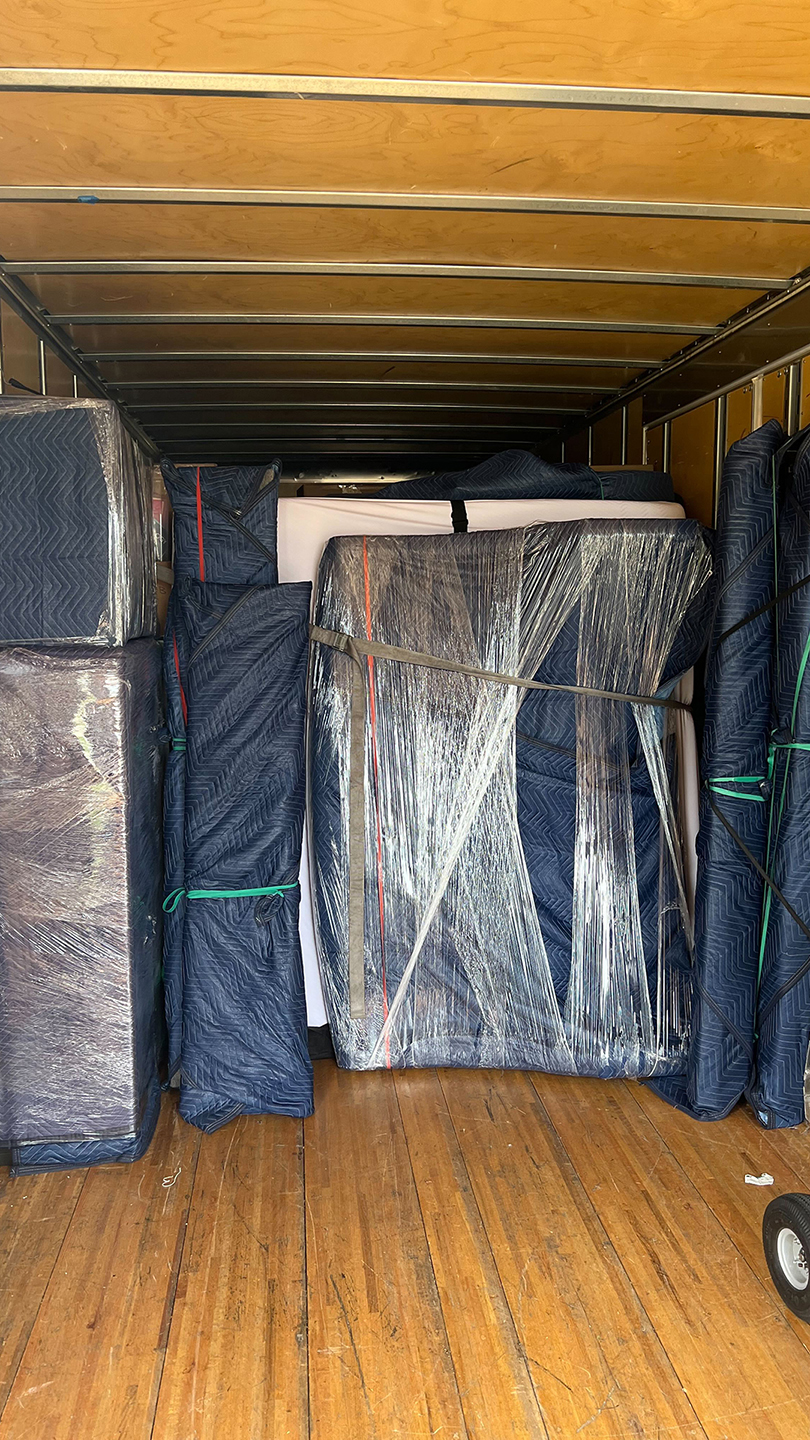
We’ve included our professional mover’s favorite tips for packing your rental truck:
- Load the heaviest items first. Start with your big items like furniture, appliances, and heavy boxes. These should go in first and be placed toward the front of the truck (closest to the cab). This helps keep the truck balanced and prevents heavy stuff from crushing lighter items.
- Use blankets or padding for added protection. Protect your furniture and fragile items by using moving blankets, towels, or bubble wrap. You don’t want your favorite chair getting scratched up during the ride!
- Secure absolutely everything! Once your big items are in place, secure them with bungee cords or ratchet straps to prevent things from shifting while you drive. The last thing you want is your couch sliding into your TV on a sharp turn.
Pre- and Post-Move Cleaning Tips
Woohoo! You did it! You’re all moved into your very first place — or you at least have the keys. While this may be exciting, there’s more to do before you can get comfortable, and that’s cleaning up after the previous owners (or tenants) before you.
🧹 Tips On Cleaning Before You Move In
Before you bring in a single box, it’s time to do a serious deep clean. Trust us, the last thing you want is to settle into someone else’s dust and grime!
If you’re lucky, maybe the previous tenants hired a cleaning crew, or if that sounds more your style, hiring one yourself can save a ton of time. But if you’re tackling it solo, no worries – you’ve got this! Crank up your favorite playlist, grab your cleaning gear, and get to work.
Deep clean before you unpack for the first time.
Break out the vacuum, mop, and your trusty cleaning supplies. Focus on wiping down all the surfaces — floors, countertops, shelves — and don’t forget the little corners and crevices.
You want everything fresh and ready for your stuff!
But what should I clean first?
Depending on the size of your first place, cleaning can always feel a little overwhelming. We don’t think it’s anyone’s favorite activity, but to make things simple, start with the high-traffic areas like the kitchen and bathroom. These are the spaces you’ll use right away, so make sure they’re sparkling clean before you start unpacking.
Once your high-traffic areas are done, you can tackle the rest of your new pad, beginning with your bedroom and followed by your living room.
Tips On Cleaning After You Move In — Clean As You Go!
Once all your boxes are in and you’ve had a moment to breathe, it’s time for round two of cleaning. Moving can kick up dust and debris, so a quick post-move clean will help you settle in comfortably.
Cleaning after unpacking.
After unpacking, you might notice some dust from moving things around. Now is a good time to give your floors another quick vacuum and mop. You can also re-wipe down surfaces to get rid of any lingering dirt or cardboard dust.
Setting up a cleaning routine to maintain cleanliness in your first place!
Cleaning isn’t a one and done task, regular cleaning is the best way to maintain your new space. We recommend putting together a simple daily and weekly cleaning routine to keep your place fresh without it feeling like a chore.
- Daily Cleaning Tasks: Wipe down counters, do a quick sweep, make your bed empty and load the dishwasher, take out the trash (if enough!), and wash dishes so things don’t pile up.
- Weekly Cleaning Tasks: Set aside a bit of time once a week to vacuum or mop the floors, clean the bathroom (showers, toilets, sinks — oh my!), complete laundry for the week, toss out any expired foods, and tidy up any clutter. Staying on top of this will make cleaning a lot less overwhelming.
- Monthly Cleaning Tasks: Dust less frequently visited surfaces, wipe baseboards, clean your windows, and replace any vacuum filters or air fresheners around your home. This will keep your new place spotless!
Getting Comfortable After the Move
Now that you’ve got everything unpacked, it’s time to make your new space feel like home. Here’s a checklist to help you settle in and be prepared for anything life throws your way.
Making Your New Place Feel Like Home
Don’t forget to personalize your space — it’s the little things in life that make us joyful and comfortable.
Personalizing your space:
Add your personal flair by hanging up art, adding some fun lighting, and bringing in a few houseplants. Small touches like these make a huge difference in turning a space from “just moved in” to “this is my home.”
💡 Pro Tip: Throw pillows and cozy blankets are super easy ways to make your living room or bedroom feel warm and inviting.
Setting up your kitchen for success:
Getting your kitchen in order will make your first few meals a breeze. Organize your cabinets and stock up on must-haves like:
- Spices: Salt, pepper, garlic powder – the basics.
- Oils: Olive oil, vegetable oil – something to cook with.
- Pantry Staples: Rice, pasta, canned goods, and snacks.
Preparing for Unexpected Needs
No one thinks about the little emergencies until they happen, so it’s smart to be prepared ahead of time. Here’s what you’ll want on hand:
1. 🧰 Basic Toolkit
Even if you’re not super handy, having a small toolkit can save you in a pinch. Make sure to have:
- Hammer
- Screwdrivers (flathead and Phillips!)
- Wrench
- Nails and screws
- Measuring tape (because you’ll want to hang stuff and know what fits where)
- Magnetic flashlight to attach to your breaker box (so you don’t have to hunt for a flashlight to turn the power back on)
- Allen keys (if possible!)
2. 🩹 First Aid Kit
Be prepared for minor bumps and bruises with your own first-aid kit — something we recommend for any homeowner or renter. Your first aid kit should include the following:
- Band-aids
- Antiseptic wipes or cream
- Antibiotic ointment
- Over-the-counter meds like ibuprofen or acetaminophen
- Tweezers
- Scissors
- Sterile Guaze (different sizes!) or gauze roll
- Instant cold compress
If you’re keen on building your own first aid kit, we recommend checking out the American Red Cross to know how to make your own.
3. 🧯 Fire Safety Items
Your safety always comes first, so make sure you pay attention to the different fire safety alarms in your home, this includes:
- Check that your smoke detectors have fresh batteries. Don’t be afraid to give them a test (just watch your ears! You should be able to hear it from anywhere in the house, but especially from where you’re sleeping.
- Have a small fire extinguisher or fire blanket on hand — especially in the kitchen!
- Educate yourself on fire safety and what to do in the event of different types of fires (e.g. grease fire in the kitchen).
Ready to move out for the first time?
If you’re ready to take your first step of independence and need help moving your belongings, get a free quote from us today!
Get A Quote